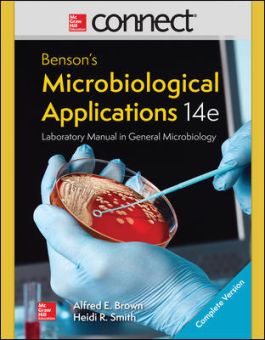Connect Online Access for Benson's Microbiological Applications Complete Version
Instant access to Connect, a comprehensive online learning platform:
- eBook, homework and adaptive assignments, and study tools
- Download the free ReadAnywhere App for offline access to your eBook
Note: Connect can only be used if assigned by your instructor.
Part 1 Microscopy
1 Brightfield Microscopy
2 Darkfield Microscopy
3 Phase-Contrast Microscopy
4 Fluorescence Microscopy
5 Microscopic Measurements
Part 2 Survey of Microorganisms
6 Microbiology of Pond Water - Protists, Algae, and Cyanobacteria
7 Ubiquity of Bacteria
8 The Fungi: Molds and Yeasts
Part 3 Manipulation of Microorganisms
9 Aseptic Technique
10 Pure Culture Techniques
Part 4 Staining and Observations of Microorganisms
11 Smear Preparation
12 Simple Staining
13 Negative Staining
14 Capsular Staining
15 Gram Staining
16 Spore Staining: Two Methods
17 Acid-Fast Staining: Kinyoun Method
18 Motility Determination
Part 5 Culture Methods
19 Culture Media Preparation
20 Preparation of Stock Cultures
21 Enumeration of Bacteria: The Standard Plate Count
22 Slide Culture: Fungi
Part 6 Bacterial Viruses
23 Determination of a Bacteriophage Titer
24 A One-Step Bacteriophage Growth Curve
25 Isolation of Phage from Flies
26 Phage Typing
Part 7 Environmental Influences and Control of Microbial Growth
27 Effects of Oxygen on Growth
28 Temperature: Effects on Growth
29 pH and Microbial Growth
30 Water Activity and Osmotic Pressure
31 Ultraviolet Light: Lethal Effects
32 The Effects of Lysozyme on Bacterial Cells
33 Evaluation of Alcohol: Its Effectiveness as an Antiseptic
34 Antimicrobic Sensitivity Testing: The Kirby-Bauer Method
35 Evaluation of Antiseptics: The Filter Paper Disk Method
36 Effectiveness of Hand Scrubbing
Part 8 Identification of Unknown Bacteria
37 Morphological Study of An Unknown Bacterium
38 Cultural Characteristics
39 Physiological Characteristics: Oxidation and Fermentation Stet Reactions
40 Physiological Characteristics: Hydrolytic and Degradative Stet Reactions
41 Physiological Characteristics: Multiple Test Media
42 Use of Bergey’s Manual
Part 9 Miniaturized Multitest Systems
43 Enterobacteriaceae Identification: The API 20E System
44 Enterobacteriaceae Identification: Entero-Pluri Test
45 Staphylococcus Identification: The API Staph System
Part 10 Diversity and Environmental Microbiology
46 Isolation of an Antibiotic Producer: The Streptomyces
47 Nitrogen Cycle: Ammonification
48 Symbiotic Nitrogen Fixation: Rhizobium
49 Free-Living Nitrogen Fixation: Azotobacter
50 Denitrification: Paracoccus denitrificans
51 The Winogradsky Column
52 Purple Nonsulfur Photosynthetic Bacteria
53 Sulfate Reducing Bacteria: Desulfovibrio
54 Bacterial Commensalism
55 Bacterial Synergism
56 Microbial Antagonism
Part 11 Applied Microbiology
57 Bacterial Food Counts
58 Bacteriological Examination of Water: Most Probable Number Determination
59 Bacteriological Examination of Water: The Membrane Filter Method
60 Reductase Test
61 Temperature: Lethal Effects
62 Microbial Spoilage of Canned Food
63 Microbiology of Alcohol Fermentation
Part 12 Bacterial Genetics and Biotechnology
64 Understanding Antibiotic Resistance: Replica Plating
65 Polymerase Chain Reaction for Amplifying DNA
66 Bacterial Transformation
Part 13 Medical Microbiology
67 The Staphylococci: Isolation and Identification
68 The Streptococci and Enterococci: Isolation and Identification
69 Gram-Negative Intestinal Pathogens
70 A Synthetic Epidemic
Part 14 Immunology and Serology
71 Slide Agglutination Test: Serological Typing
72 Slide Agglutination Test for S. aureus
73 Slide Agglutination Test for Streptococcus
74 Enzyme-Linked Immunosorbent Assay (ELISA)
75 Blood Grouping
Appendices
• A digital version of the course textbook that saves you time while improving performance.
• Access to your instructor’s homework assignments, quizzes, syllabus, notes, reminders, and other important files for the course.
• Progress dashboards that quickly show how you are performing on your assignments and tips for improvement.
• The option to purchase (for a small fee) a print version of the book. This binder-ready, loose-leaf version includes free shipping.
Complete system requirements to use Connect can be found here: http://www.mheducation.com/highered/platforms/connect/training-support-students.html
McGraw-Hill Connect is an award-winning digital teaching and learning solution that empowers students to achieve better outcomes and enables instructors to improve course management efficiency.
High-Quality Course Material
Our trusted solutions are designed to help students actively engage in course content and develop critical higher-level thinking skills while offering you the flexibility to tailor your course to the ways you teach and the ways your students learn.
Assignments & Automatic Grading
Connect features a question bank that you can select from to create homework, practice tests and quizzes. Dramatically reduce the amount of time you spend reviewing homework and grading quizzes, freeing up your valuable time to spend on teaching.
Analytics & Reporting
Monitor progress and improve focus with Connect’s visual and actionable dashboards. Reports are available to empower both instructors and students with real-time performance analytics.
Seamless Integration
Link your Learning Management with Connect for single sign-on and gradebook synchronization, with all-in-one ease for you and your students.


